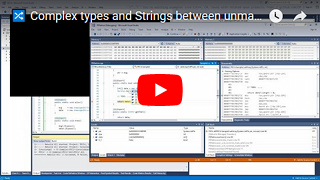Conari
🧬 An unmanaged memory, modules, and raw data in one-touch.
Conari engine represents most flexible platform for working with unmanaged memory, modules, related P/Invoke features, and more around libraries, executable modules, runtime dynamic use of the unmanaged native C/C++ in .NET world and other raw data just in a few easy steps without configuring something, and... Even accessing to complex types like structures without their declaration at all.
[ Quick start ] [ Complex types and strings ] -> { Wiki }
Why Conari ?
It was designed to be loyal to your needs on the fly!
🔍 Easy to start
using ConariL l = new("...");🧰 Powerful types
No more manual type conversions and memory management complexities. Because nothing easier than just use it,
using dynamic l = new ConariX("regXwild.dll");
string data = "number = 888;";
bool found = l.replace<bool>(ref data, "+??;", "2034;");
// found: true; data: number = 2034;🔨 Its amazing DLR features
using dynamic l = new ConariX("...");
l.<whatever_you_want>(curl, 10002, "https://");Still not convinced? Here's full workable code example for regXwild:
using var c = ConariL.Make(new("regXwild"), out dynamic l);
// ready for everything even without configuring
using var u = NativeStruct.Make.f<UIntPtr>("start", "end").Struct;
/* Hey! We just generated a structure like
[StructLayout(LayoutKind.Sequential)]
private struct MatchResult
{
public UIntPtr start;
public UIntPtr end;
}*/
if(l.match<bool>("n = '888';", "'*'", 2/*MATCH_RESULT*/, u))
{
/* Now we just generated and invoked this
REGXWILD_API_L bool match
(
const rxwtypes::TCHAR* input,
const rxwtypes::TCHAR* pattern,
rxwtypes::flagcfg_t options,
EssRxW::MatchResult* result
)
*/
dynamic v = u.Access; // just access the EssRxW::MatchResult* result
// v.start == 4; v.end == 9;
}
// Yes, a 4 lines and your task is done; Free memory, Free hands.🚀 Awesome speed
Optional caching of 0x29 opcodes (Calli) and more.
| test of regXwild's algorithms [340x10000 Unicode] | +icase [x32] | +icase [x64] | ` |
|---|---|---|---|
regXwild native C++ EXT algorithm |
~50ms | ~26ms | << |
| regexp-c++11(regex_search) | ~59309ms | ~53334ms | |
| regexp-c++11(regex_match with endings .*) | ~59503ms | ~53817ms | |
| .NET Regex engine [Compiled] | ~38310ms | ~37242ms | |
| .NET Regex engine | ~31565ms | ~30975ms | |
regXwild via Conari v1.3 (Lambda) - EXT |
~54ms | ~35ms | << |
regXwild via Conari v1.3 (DLR) - EXT |
~214ms | ~226ms |
🔧 The easiest (most ever) access to any data in unmanaged memory
// Everything will be generated at runtime
memory.Native()
.f<WORD>("Machine", "NumberOfSections") // IMAGE_FILE_HEADER (0xF4)
.align<DWORD>(3)
.t<WORD>("SizeOfOptionalHeader")
.t<WORD>("Characteristics")
.region()
.t<WORD>("Magic") // IMAGE_OPTIONAL_HEADER (0x108)
.build(out dynamic ifh);
if(ifh.SizeOfOptionalHeader == 0xF0) { // IMAGE_OPTIONAL_HEADER64
memory.move(0x6C);
}
// Use it !
ifh.NumberOfSections // 6
ifh.Characteristics // IMAGE_FILE_EXECUTABLE_IMAGE | IMAGE_FILE_LARGE_ADDRESS_AWARE | IMAGE_FILE_DLL
ifh.Machine // IMAGE_FILE_MACHINE_AMD64
ifh.Magic // PE64dynamic l = ptr.Native().f<int>("x", "y").build();
l.x // 17
l.y // -23🏄 Most powerful PInvoke and even most convenient use of WinAPI without preparing something
Conari will generate and adapt everything at runtime! Specially for you! For example, below we don't provide neither user32.ShowWindow() nor user32.MessageBoxA(), even no kernel32.GetModuleHandleA/W()
dynamic user32 = new User32();
user32.ShowWindow(0x000A0A28, 3);
user32.MessageBoxA(0, "Conari in action", "Hello!", 0);dynamic kernel32 = new Kernel32();
kernel32.GetModuleHandleA<IntPtr>("libcurl-x64");
kernel32.GetModuleHandleW<IntPtr>((WCharPtr)ustr);Because our recipe is simple, Just use it! and have fun.
🔖 Modern .NET Core
Conari is ready for .NET Core starting from 1.4. Even for .NET Standard 2.0 which does not cover unmanaged EmitCalli due to missing implementation for System.Private.CoreLib. Now this is another one of independent solution for everyone as https://github.com/3F/UnmanagedEmitCalli
🍰 Open and Free
Open Source project; MIT License; Fork! Star! Contribute! Share! Enjoy!
Conari is available for everyone from 2016 🎉
🗸 License
Copyright (c) 2016-2021 Denis Kuzmin <x-3F@outlook.com> github/3F
Conari contributors https://github.com/3F/Conari/graphs/contributors
We're waiting for your awesome contributions!
Take a look closer
Conari generally provides two mode,
Fully automatic way through its dynamic features (DLR). For example, when using the unmanaged code:
var ptr = d.test<IntPtr>(); //lambda ~ bind<Func<IntPtr>>("test")();
var codec = d.avcodec_find_encoder<IntPtr>(AV_CODEC_ID_MP2); //lambda ~ bind<Func<ulong, IntPtr>>("avcodec_find_encoder")(AV_CODEC_ID_MP2);
d.push(); //lambda ~ bind<Action>("push")();
d.create<int>(ref cid, out data); //lambda ~ bind<MyFunc<Guid, object>>("create")(ref cid, out data);This (or like) does not require the any configuration from you, because Conari will do it automatically.
Semi-automatic way through its custom lambda expressions. For example, when using the unmanaged code:
using(var l = new ConariL("Library.dll"))
{
l.bind<Action<int, int>>("call")(2, 1);
double num = l.bind<Func<IntPtr, int, double>>("tonumber")(L, 4);
}This also does not require neither the creation of any additional delegates nor the configuring something. Just a more control through l.bind<...>("...") methods that still make you happy;
// invoke it immediately
l.bind<Action<int, string>>("set")(-1, "Hello from Conari !");
// or later
set(-1, "Hello from Conari !");Native C/C++ structures without declaration [?]:
// IMAGE_FILE_HEADER: https://msdn.microsoft.com/en-us/library/windows/desktop/ms680313.aspx
dynamic ifh = binaryData.Native()
.t<WORD, WORD>(null, "NumberOfSections")
.align<DWORD>(3)
.t<WORD, WORD>("SizeOfOptionalHeader")
.build();
if(ifh.SizeOfOptionalHeader == 0xF0) { // IMAGE_OPTIONAL_HEADER64
...
}
// IMAGE_DATA_DIRECTORY: https://msdn.microsoft.com/en-us/library/windows/desktop/ms680305.aspx
binaryData.Native()
.t<DWORD>("VirtualAddress")
.t<DWORD>("Size")
.build(out dynamic idd);
DWORD offset = rva2Offset(idd.VirtualAddress);IntPtr ptr ...
Raw mt = ptr.Native()
.align<int>(2, "a", "b")
.t<IntPtr>("name")
.Raw;
- {byte[0x0000000c]} byte[]
[0] 0x05 byte --
[1] 0x00 byte |
[2] 0x00 byte |
[3] 0x00 byte --^ a = 5
[4] 0x07 byte --
[5] 0x00 byte |
[6] 0x00 byte |
[7] 0x00 byte --^ b = 7
[8] 0x20 byte --
[9] 0x78 byte |_ pointer to allocated string: (CharPtr)name
[10] 0xf0 byte |
[11] 0x56 byte --
...A modern NativeData chains for everything (Memory, Streams, Local collections, ...)
.move(0x3C, Zone.D)
.read(out LONG e_lfanew)
.move(e_lfanew, Zone.D)
.eq('P', 'E', '\0', '\0')
.ifFalse(_ => throw new PECorruptDataException())
.Native()
.f<WORD>("Machine", "NumberOfSections")
.align<DWORD>(3)
.t<WORD, WORD>("SizeOfOptionalHeader", "Characteristics")
.region()
.t<WORD>("Magic") // start IMAGE_OPTIONAL_HEADER offset 0 (0x108)
.build(out dynamic ifh)
.Access
.move(ifh.SizeOfOptionalHeader == 0xF0 ? 0x6C : 0x5C)
.read(out DWORD NumberOfRvaAndSizes)
.Native() // DataDirectory[IMAGE_DIRECTORY_ENTRY_EXPORT]
.t<DWORD>("VirtualAddress")
.t<DWORD>("Size")
.build(out dynamic idd)
.Access.move(8 * (NumberOfRvaAndSizes - 1))
...
// ifh.Machine; - IMAGE_FILE_MACHINE_AMD64
// e_lfanew - 0x110
// NumberOfRvaAndSizes - 16
// idd.VirtualAddress - VA 0x7070
// ifh.Characteristics; - IMAGE_FILE_EXECUTABLE_IMAGE
// | IMAGE_FILE_LARGE_ADDRESS_AWARE
// | IMAGE_FILE_DLL
// ifh.Magic; - PE64
// ifh.NumberOfSections; - 6
// ...Calling Convention & Name-Decoration [?]
using(var l = new ConariL("Library.dll", CallingConvention.StdCall))
{
//...
l.Mangling = true; // _get_SevenStdCall@0 <-> get_SevenStdCall
l.Convention = CallingConvention.Cdecl;
}Exported Variables [?] & raw accessing [?]
l._.ADDR_SPEC // DLR, 0x00001CE8
l.V.get<UInt32>("ADDR_SPEC"); // lambda, 0x00001CE8
std_cin = l.addr("?cin@std@@3V?$basic_istream@DU?$char_traits@D@std@@@1@A");Aliases [?]
// v1.3+
l.Aliases["Flag"] = l.Aliases["getFlag"] = l.Aliases["xFunc"]; //Flag() -> getFlag() -> xFunc()->...
// ...
l._.getFlag<bool>();Additional types
- TCharPtr, CharPtr, WCharPtr, float_t, int_t, ptrdiff_t, size_t, uint_t, ...
- NativeString<T> (+NativeStringManager<T>) - Fully supports TCharPtr, CharPtr, WCharPtr;
- NativeStruct - Fully automatic way of working with structures without declarations using NativeData chains;
- NativeStruct<T> - Semi-automatic way of working with structures using CLR types declarations;
- NativeArray<T>
- ...
using var a = new NativeString<WCharPtr>("Hello");
using var b = a + " world!"; // unmanaged C-string, a Unicode charactersCharPtr name = c.to<CharPtr>(1, out size_t len);
//CharPtr name = c.bind<FuncOut3<int, size_t, IntPtr>>("to")(1, out size_t len);
string myName += name; // 8 bit C-string and managed string (UTF-16)using NativeArray<short> nr = new(pointer); // points to ~0x2674F89EDF0
nr[0] = 1; nr[1] = 2;using NativeArray<int> nr = new(1, 2, 3);
nr[0] = -1;
nr[1] = 0;
nr[2] = 1;
Assert.True(nr == new int[] { -1, 0, 1 });using var u = new NativeStruct<MatchResult>();
l.match<bool>(
"[system]", "Sys###",
EngineOptions.F_ICASE | EngineOptions.F_MATCH_RESULT,
u
);
u.Data.start // 1
u.Data.end // 7using ConariL l = new("regXwild.dll");
l._.replace<bool>
(
l._T("number = 888;", out CharPtr result),
l._T("+??;"), l._T("2034;")
);
// result: number = 2034;using dynamic l = new ConariX(RXW_X);
bool found = l.replace<bool>
(
"Hello {p}".Do(out TCharPtr result),
"{p}",
"world!"
); // found: true; result: Hello world!and more ...
✏ Examples
How about regXwild (⏱ Superfast ^Advanced wildcards++? on native unmanaged C++) in your C# code?
using dynamic l = new ConariX("regXwild.dll");
if(l.match<bool>(input, "'+.#?'")) {
// ... '1.4', '1.04', ...
}Yes, you don't need to do anything else! Conari will prepare everything for binding with the following native method instead of you:
REGXWILD_API_L bool match
(
const rxwtypes::TCHAR* input,
const rxwtypes::TCHAR* pattern,
rxwtypes::flagcfg_t options = 0,
EssRxW::MatchResult* result = nullptr
);How to get Conari
- NuGet:
gnt/p:ngpackages="Conari"[?]- GitHub Releases [ latest ]
- CI builds at your own risk. Find latest binaries in
/artifactspage.





